- Home
- Lucy Gillen
Winter at Cray
Winter at Cray Read online
WINTER AT CRAY
Lucy Gillen
It was a great day for the Kincaid family when their beloved Great-grandmama Emma Kincaid was one hundred years old.
But there was one big fly in the ointment as far as Louise Kincaid was concerned—that annoying reporter, Jonathan Darrell, who seemed rather more interested in her affairs than those of her great grandmother!
CHAPTER ONE
LOUISE glanced yet again at the clock and once again told herself that it was ridiculous to be so nervous for no better reason than that a journalist was coming to Cray to see her great-grandmother. Past dealings with member,’ of the press, however, had left her with a wariness of them that was impossible to lose, even after four and a half years.
It was to be expected that the old lady’s one hundredth birthday would arouse some interest outside the family, for in her time Emma Kincaid had lived through as many adventures as would suffice half a dozen other women. She was reputed to be one of the few survivors of the Klondike gold rush and as such she was bound to be of interest apart from her great age.
She had conceived and borne three sons and a daughter in the incredible conditions that prevailed in those hard but exciting times and seen all of them grow to adulthood. Her husband and her eldest son had perished in the first world war, but the rest of her family still thrived, in fact Charlotte, her only daughter and unmarried, lived at Cray with her. Hector, her youngest son, was Louise’s grandfather.
It was a pity, Louise thought, that more of the family could not have come to Cray for the celebration of the old lady’s birthday, but for most of them the journey was a long and arduous one, and then there was the added possibility that having travelled so far they would not be able to cross to the island because of the weather.
When the magazine, World of Tomorrow, had written to suggest coming to see her and featuring her in an article with pictures, Emma Kincaid had been delighted, although Louise had been doubtful about the wisdom of it. She had tentatively suggested that it would be rather a strain with the excitement of the birthday as well, but the old lady had positively beamed with pride at the prospect of it and instructed Louise to write back and invite the magazine to send whoever they liked; accommodation would be found for them and they could stay as long as they liked.
Berren was only a very small island, off the west coast of Scotland, but it had been home to Emma Kincaid before she sailed with her widowed father for America over ninety years ago and it was home to her again now. She had bought the island when she returned to the old country just after the start of the first world war, a very much wealthier woman than she had left it, but a lonely one without her beloved Robert.
Louise looked again at the time and got up from her chair with a sigh. ‘I’d better go and meet the boat, Great-gran,’ she told the old lady, and Emma Kincaid smiled, bright blue eyes glistening with anticipation, her small bird-like face eager as a child’s.
‘Thank goodness the snow kept off,’ she said, ‘or they might not have got here.’
‘And you’d have been very disappointed,’ Louise accused, smiling despite her own misgivings.
‘I should have,’ Emma declared stoutly. ‘I’ll enjoy being a celebrity and appearing in that fancy book.’
Louise shook her head. ‘I’m not sure so much excitement is good for you,’ she told her, ‘even if this Jonathan Darrell is a big name in journalism, I’m not sure you should be pestered by interviews and photographers at your age.’
‘At my age I’m entitled to it,’ the old lady retorted. ‘Now you go down and meet that boat, my girl, before I go myself.’
It was improbable but not impossible that the threat would be carried out, Louise thought wryly; she had long since given up thinking of her great-grandmother as a docile old lady.
As she walked down the steep hill to the quay, Louise eyed the dark, overcast sky and frowned. It looked as if the snow would not keep off much longer and when it came the steamer that plied between Berren and the mainland would no longer be able to make the journey. It was not unknown for the island to be cut off for several days or even weeks in the worst of winter, and the idea of having strangers in their midst for so long, and journalists at that, did not please her in the least.
As the steamer laboured its way across the sullen grey water and approached the pier she found, to her annoyance, that her hands were trembling and there was a tightness in her throat that shortened her breath quite alarmingly. It was only with difficulty that she managed to appear normally calm and unperturbed as she watched the process of tying-up.
There were only two people to disembark and she eyed them with more curiosity than welcome as they walked the length of the narrow pier towards her. One of them, she noted with some surprise, was a rather glamorous and baby-faced blonde girl. She had expected Miss Esther Nostrum to be more plain and businesslike somehow, though she couldn’t have said why.
The girl wore a bright red coat and a fur cap that only partially covered her blonde hair, but she had a friendly smile which Louise was relieved to see. The man accompanying her dwarfed her by comparison, a thick sheepskin jacket and bulky sweater adding to his size. He had an untidy thatch of black hair and a lean, dark face that for some reason or other looked vaguely familiar to Louise, and he looked a little surprised to see her there.
It was, she realised a moment later, probably unusual for them to be met and they probably misinterpreted the gesture as over-enthusiasm. Wide, dark-brown eyes surveyed her curiously while he covered the last few feet of the approach, and Louise could do little about the warmth of colour that came into her cheeks under the scrutiny. She was not, she thought grimly, going to like Jonathan Darrell at all, apart from the fact that he was a journalist.
She was not unaware of her own attractions, but it had been a long time since any man had looked at her in quite that way and she instinctively shrank from the implication of the look.
Jonathan Darrell, in his turn, saw a girl, small and slight, with wide blue eyes and a fair, soft skin that belied her years on this exposed island. Copper red hair showed from beneath the hood of a thick green coat and there seemed to be an indefinable air of sadness about her that added to her appeal. She was, in fact, more beautiful than she realised and an unexpected sight in this rather desolate spot.
‘Miss Nostrum? Mr. Darrell?’ She instinctively proffered a hand to the girl first, responding to the friendly smile, if only briefly. ‘I’m Louise Kincaid.’ She always used her maiden name now and had done for nearly five years so that she would have felt strange using any other.
‘It’s good of you to meet us,’ Esther Nostrum told her, ‘and it’s nice to meet you, Miss Kincaid.’ In the absence of a wedding ring, the choice of title was inevitable, and Louise preferred it that way.
Jonathan Darrell was still studying her with interest and there was a ghost of a smile round his mouth, a smile that lingered in his eyes so that when Louise turned to him, she looked away again hastily, disliking the warning flutter of her pulse.
Strong fingers closed over her hand briefly. ‘Welcome to Berren, Mr. Darrell.’
‘Thank you—er—Miss Kincaid?’ He looked pointedly at her naked left hand clasping her gloves and she felt herself colour again, hastily withdrawing her other hand, wondering in sudden panic whether he recognised her or her name.
‘Will you come with me?’ She turned back towards the steep walk up to the house, uneasy and more than ever doubtful of the wisdom of having them there. ‘Gray—the house—isn’t far, but it’s quite a climb until one gets used to it.’ She looked down at the girl’s two suitcases and her equipment standing beside Jonathan Darrell’s hold-all. ‘If I take your holdall, Mr. Darrell,’ she suggested, ‘Miss Nostrum could perhaps ma
nage to carry her camera and things, then I’m sure you wouldn’t mind bringing the two suitcases, would you?’
If he minded, she thought, he made no remark but picked up the cases and followed her with only a briefly arched brow for comment.
Cray had been built on the highest ground available, apparently with the idea of having the finest view of the surrounding islands and the sea, with the mainland mistily discernible a few miles away.
There were a few other houses on the island, but Cray dominated them all. Tiny stone cottages, built to withstand the brutal onslaught of the winter gales, and huddled into a protective little community below the high rise that was crowned by the big house.
Cray itself looked tall and gaunt from below, almost feudal in its grandeur and surrounded by the wind-deformed shapes of trees, clinging precariously to life around the old house, bare-armed and old in the north-east wind that threatened snow.
Seeing it for the first time, Jonathan Darrell shivered briefly and Louise turned her eyes to him questioningly. ‘You feel the cold, Mr. Darrell?’ She sensed an air of uneasiness about him as they approached the house and it puzzled her. Surely this must be no more than a routine assignment to a man in his position, so why should he be uneasy about it? A moment later she dismissed the idea as not only her imagination but highly improbable; he was far too sure of himself to be uneasy about anything.
She had to admit that he was far younger than she had expected when she remembered his reputation. Even here on Berren she had heard of him and indeed read quite a lot of his work in various magazines, so that she had expected an older man, someone more worldly-wise and perhaps a little brashly overconfident. Instead he was young and, she was forced to admit, rather attractive. Certainly self-confident, except for that brief air of uneasiness, but not in a brash, verbose way, also there was that daunting familiarity about him which still refused to be recognised.
‘The wind’s very cold,’ he answered, surprising her in a sidelong glance of frowning curiosity and smiling at it. ‘This isn’t exactly a desert island, is it?’
She flushed as if the criticism had been personal to her and her stride was more purposeful as she led them up the steep slope to the house. She loved Berren and resented any criticism of it.
‘Berren is very beautiful in summer, Mr. Darrell, and it even has a kind of gaunt beauty at this time of year if one takes the trouble to see it.’
She felt his gaze on her, studying her as a moment before she had been studying him, and with almost as much curiosity. ‘You live here?’ he asked, and she nodded, unwilling to be questioned too closely, although she supposed in the circumstances, questions were inevitable. He need not, she thought, have sounded quite so horrified at the idea of living here.
‘I’ve lived here for over four years,’ she informed him.
He shivered again as a searching gust of wind blew over them like a shower of ice. ‘I don’t envy you, it looks like the last place on earth.’
Louise turned and looked at him again, frowning her disapproval. ‘It’s beautiful here, Mr. Darrell, and I venture to suggest that you’ve scarcely had time to judge it yet.’
‘I’ll take your word for it,’ he told her wryly. ‘I was never very partial to life in the wilderness, but I admire your stamina.’
Louise held her tongue, unwilling to indulge the uncharacteristic flash of temper that made her cheeks bum and tightened her fingers on the handle of the hold-all she carried.
The big oak door yielded easily to her touch and she led the way into a blessedly warm hall, where the tall, gaunt figure of Hannah Grayston greeted them. ‘It’s blowing up for snow, Hannah,’ she greeted the housekeeper. ‘Will you show Miss Nostrum and Mr. Darrell to their rooms, please?’ She looked again at Jonathan Darrell. ‘I’m afraid you have to share a rather small room, Mr. Darrell, but I think you’ll find it quite comfortable.’
‘I’m sure I shall, thank you.’ The smile he gave her was as disturbing as it was unexpected and not in the least like the rather cynical one he had shown earlier. Tt’s very good of you to go to so much trouble for us. We’re quite used to roughing it, you know.’
She half-smiled, wondering vaguely at the familiar ‘we’; it made it sound as if he and his blonde companion were a couple in more senses than one, and she had a crazy thought for a moment that perhaps she should have put them in one room. A moment later she dismissed it hastily as uncharitable and hastened on to explain:
‘In this part of the world, Mr. Darrell, we have a reputation for hospitality, you know, and we can’t have it said that Cray was less than expected in that respect.’
‘I wouldn’t dream of suggesting it,’ he assured her solemnly, and smiled that slow smile again, so that his brown eyes crinkled at the corners and made him look younger. He was, Louise decided unwillingly, quite disturbingly attractive, something she had thought herself immune to for a long time, and she nodded only briefly before turning away.
Only eight of old Emma Kincaid’s family had managed to arrive for the centenary birthday celebration and most of them were gathered together in the big, rather dull room on the north side of the house. Heads were raised when Louise came into the room and enquiring brows asked unspoken questions.
‘It’s the journalist, Jonathan Darrell,’ she explained, disposing of her coat on to a nearby chair, ‘and a photographer too.’
‘Such is fame,’ a wry voice commented, and Louise smiled reluctant agreement.
‘Such is fame,’ she echoed. ‘They must think Great-gran is very famous to have sent Jonathan Darrell all out here to see her. He’s very well known.’
‘I saw him from the window—he’s very dishy too, isn’t he?’ That was Diamond, of course, Louise thought wryly. Diamond Kincaid always seemed to Louise to be incredibly silly and she wondered if her cousin Colin ever grew tired of hearing his brittlely attractive wife wax enthusiastic over every presentable man she met. He quite obviously adored her, after two years of marriage, but even the fact that they were now parents of a baby girl had done nothing to dim Diamond’s eye for attractive men.
‘He’s quite nice,’ Louise admitted, remembering uneasily the effect of that slow, unexpectedly disturbing smile. ‘But he’s not very impressed with Berren, I’m afraid.’
Diamond laughed, wrinkling her nose. ‘I don’t altogether blame him,’ she declared. ‘It’s not the cosiest place in winter, is it?’
‘Darling,’ Colin chided her gently, ‘you shouldn’t say things like that about the island; you know how Louise loves it, and it is her home.’
Colin Kincaid’s brown eyes apologised for his young wife’s lack of tact and Louise wondered for the thousandth time what had brought her quiet, self-effacing cousin and his wife together. At thirty-two, and one of the old lady’s great-grandchildren, he was slim and tall, with fair hair and rather appealing brown eyes that seemed always to be apologising for something. He was perhaps the best-looking man in the family, apart from her cousin Stephen, although Louise thought he would have been more attractive had he been less boyish’ and more virile-looking.
She shook her head over his remark to his wife and smiled. ‘I don’t mind, Colin, if people don’t like Berren they’re at liberty to say so, but it’s their loss, I think. I find the island not only beautiful but very peaceful.’
She saw Diamond’s full mouth curl derisively at her defence of Berren and could not control the faint flush that warmed her cheeks. She had never liked the doll-like blonde her cousin had married and she supposed she never would.
‘Are we all to be interviewed or is it only Grand-mama they’re interested in?’ The speaker sat in the window the other side of the room, but the deep voice carried easily to Louise, who looked across at her and smiled. She was very fond of Jessie Ross and knew she shared her own love of the little island.
‘I think we’ll all come in for a share of the limelight, Aunt Jessie,’ she informed her aunt, her former misgivings returning twofold at the thought of it, �
�but Great-gran will be the centre of attraction, of course.’
Jessie Ross was the daughter of Robert Kincaid the younger and bore a remarkable resemblance both to her father and her .grandfather, a fact which endeared her to old Emma Kincaid, who had loved her late husband devotedly. She chuckled at Louise’s answer, her eyes dancing. ‘And she’ll love every minute of it, bless her. Tell me, is the young man from the press as personable as Diamond claims?’ she asked, her eyes on Louise’s studiously blank face.
‘Yes, I suppose he is,’ Louise admitted. ‘He’s quite good-looking.’ Good-looking was not quite the way to describe Jonathan Darrell’s attraction, she supposed, but it was as far as she was prepared to go. It was with relief that she turned to welcome a newcomer to the room.
She adored her grandfather and smiled at the round, wind-flushed face he presented. Hector Kincaid was old Emma’s youngest son, a short, wiry, white-haired man, very much like his mother except that he had inherited his father’s brown eyes. ‘It’s blowing up for something pretty foul, I should say,’ he remarked as he moved across to the fireplace and extended cold fingers to the blaze. ‘We shall probably be snowed in by this time tomorrow.’
‘Oh, darling, don’t be such a pessimist,’ Diamond pouted at him, and Hector Kincaid merely cast her a look that would have quelled anyone less thick skinned than the tiny blue-eyed blonde. The old man had never had much time for Colin’s choice of a wife and he made little effort to disguise it.
For one thing he held rather old-fashioned views on stage people and on young ladies of the chorus in particular, and that was what Diamond had been before Colin married her. For another she looked far less than her twenty years, and Hector considered that Colin should have married someone nearer his own age and not a girl little more than a child.

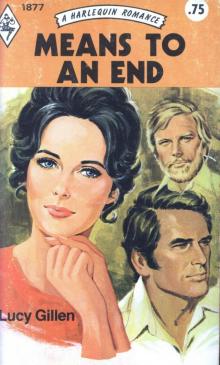 Means to an End
Means to an End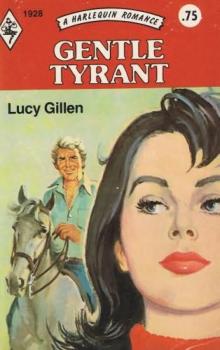 Gentle Tyrant
Gentle Tyrant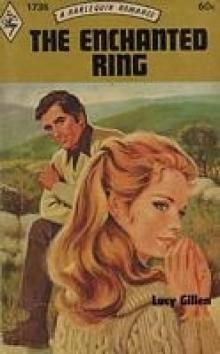 The enchanted ring
The enchanted ring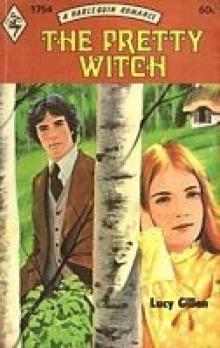 The pretty witch
The pretty witch The Runaway Bride
The Runaway Bride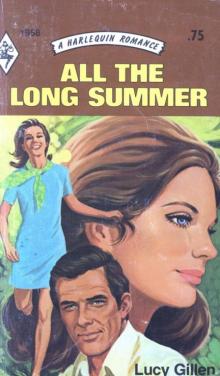 All the Long Summer
All the Long Summer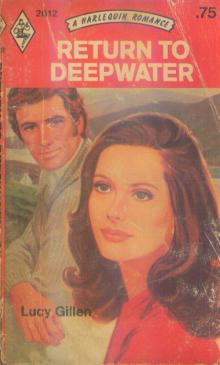 Return to Deepwater
Return to Deepwater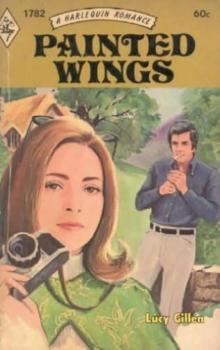 Painted Wings
Painted Wings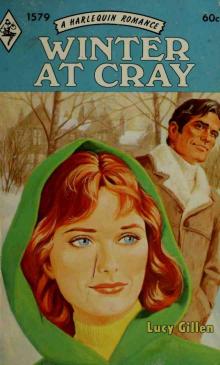 Winter at Cray
Winter at Cray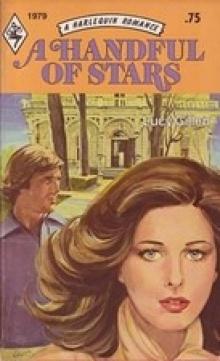 A handful of stars
A handful of stars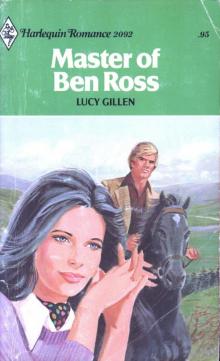 Master of Ben Ross
Master of Ben Ross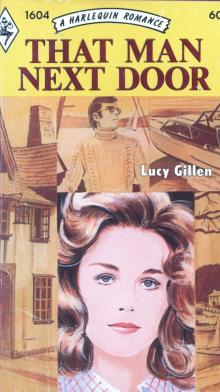 That Man Next Door
That Man Next Door